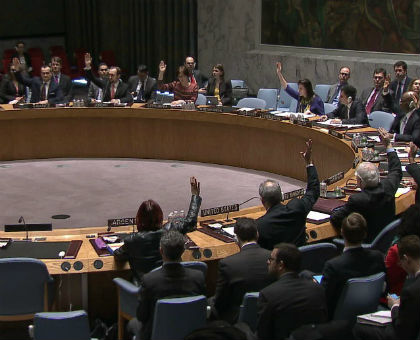A credible military response is needed to swiftly and conclusively disarm and demobilize the Democratic Forces for the Liberation of Rwanda (FDLR) militia, the UN Security Council urged yesterday in a statement.


A credible military response is needed to swiftly and conclusively disarm and demobilize the Democratic Forces for the Liberation of Rwanda (FDLR) militia, the UN Security Council urged yesterday in a statement.
Noting that the FDLR remains a group made up of perpetrators of the 1994 Genocide against the Tutsi in Rwanda and continues to recruit and train combatants to commit "ethnically based” killings in the DRC and Rwanda, the Security Council described disarming the militia as a "top priority”.
The FDLR has ravaged parts of eastern DR Congo, terrorizing and murdering those within its area of control.
The Council is worried about the stalled voluntary FDLR demobilisation process after regional leaders accorded the militia a six-month deadline to lay down their arms.
"They (members of the Security Council) expressed concern about reports by the Special Representative of the Secretary-General for the DRC (Martin Kobler) that the FDLR has interpreted this six-month timeframe as a call to stall previously scheduled demobilizations. They noted that the disarmament process should be concluded swiftly, have a clearly defined end-state and be supported by credible military action,” the statement read.
Members of the Council believe that the swift neutralization of the FDLR will bring stability to the DRC and the Great Lakes Region.
A fortnight ago, heads of state and government of the International Conference of the Great Lakes Region (ICGLR) reiterated a six-month ultimatum, commencing on July 2, for the FDLR to voluntarily surrender. They also set an October deadline to evaluate the process before considering launching military operations to eradicate the militia.
The resolution, which was passed at the second mini-summit of Heads of State and Government of the ICGLR in the Angolan capital Luanda, did not sit well with Rwanda.
The latter expressed reservation on subscribing to the FDLR a ‘voluntary surrender’ process as a condition to the beginning of military action to eradicate the militia because it would give room for the FDLR to reorganise its forces.
"Rwanda considers the deadline for action against FDLR long passed and warns against the delaying tactics and diversions,” Foreign Affairs minister Louise Mushikiwabo had said from the second mini-summit of the ICGLR Heads of State and Government.
Members of the UNSC noted on Tuesday that the disarmament process of the FDLR needed to be concluded swiftly and have a "clearly defined end-state and be supported by credible military action”.
They also encouraged the DRC government, in coordination with the UN’s Stabilisation Mission in the DRC (MONUSCO), to "actively pursue military action against those leaders and members of the FDLR who do not engage in the demobilisation process or who continue to carry out human rights abuses”.
MONUSCO has a mandate to neutralise all armed groups in the DRC, in line with UN resolutions 2098 (2013) and 2147 (2014), and support the demobilization process of the rebels.
But many analysts, including political scientist Jean de la Croix Nkurayija, a senior lecturer at the University of Rwanda, say that neither MONUSCO nor the DRC government have shown political will to fight the FDLR.
"It would be utopia to ask MONUSCO or the DRC forces to be the only ones to disarm the FDLR; it’s just going to involve a lot of delays because they haven’t shown political will,” Nkurayija said.
The don has recommended that other regional forces be involved in fighting the FDLR if a credible military action is to be mounted against the militia.
"Both MONUSCO and FARDC seem to have interests in delaying the process of military action. The credible military action would require involving military forces from regional countries in Africa,” he said.


